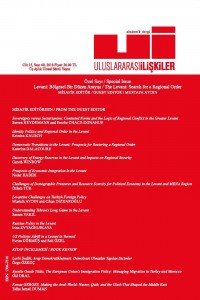Abstract
Türkiye’nin Levant bölgesine yönelik algısı değişkendir. Türkiye, 1990’ların sonundan itibaren bölge ülkeleriyle yakın işbirliği arayışında olmasına ragmen, hernüz bölgeye yönelik bütüncül bir yaklaşım geliştirememiştir. Türkiye’nin bölgeye açılma isteğinin yanı sıra, son yıllarda Doğu Akdeniz’de hidrokarbon kaynaklarının keşfi, Arap Baharı’nın patlak vermesi ve bölgesel güç dengesindeki değişimler gibi uluslararası gelişmeler Türkiye’nin bölgeyle etkileşimine ivme kazandırmıştır. Bu çalışma, söz konusu gelişmelerin Türkiye’nin bölgede daha iddialı bir rol oynamasına imkan sağlamasına ragmen, Türkiye’nin bugüne kadar bölge geneline yönelik etkili bir strateji sergileme veya bir nüfuz alanı oluşturma konusunda başarılı olamadığını vurgulamaktadır.
References
- .....
Abstract
Turkey’s perception of the Levant has been hazy in modern times and the country has not constructed a holistic approach towards the region until recently, despite the fact that Turkey has sought closer cooperation with the Levantine countries since the late 1990s. In addition to Turkey’s willingness to open up to the region, recent international developments, such as the discovery of hydrocarbons off the coast of Israel, Egypt and Cyprus, the outbreak of the Arab Spring, and changes in the regional balance of power have provided momentum for Turkey’s engagement with the region. This paper argues that although these factors have provided space for Turkey to play a more assertive role in the region, the country has thus far failed to present a successful region-wide strategy or carve up an influence zone.
References
- .....
Details
| Primary Language | English |
|---|---|
| Journal Section | Articles |
| Authors | |
| Publication Date | December 1, 2018 |
| Published in Issue | Year 2018 Special Issue: The Levant: Search for a Regional Order |


